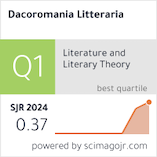ȘTEFAN BAGHIU
THE SOCIALIST REALIST NOVEL IN ROMANIA BETWEEN 1948 AND 1955.
NOVELISTIC GENRES AND SUBGENRES
DOI: 10.33993/drl.2020.7.56.71
Author's coordinates: “Lucian Blaga” University of Sibiu, 5-7 Victoriei Blvd., 550024, Sibiu, Romania.
Email: stefan.baghiu@ulbsibiu.ro
THE SOCIALIST REALIST NOVEL IN ROMANIA BETWEEN 1948 AND 1955.
NOVELISTIC GENRES AND SUBGENRES
(Abstract)
This paper aims to survey some of the key elements of the socialist realist novel and to explain why it is, in fact, an umbrella term for more subgenres, seeking uniformity only in its desire to connect literature with a more or less coherent ideological programme. More, or rather, less coherent because, in spite of the theses formulated in literary historiography according to which socialist realism represents the brutal standardization of creative principles, many recent studies have shown that this standardization was primarily accomplished “along the way”, through various mechanisms of verification and critique and in accordance with often changeable strategies. In the following, I propose a classification of the Romanian socialist realist novel based on the analysis of the “archive”, into: the industrial novel, the rural novel, novels for children and the youth, the historical and adventure novel, the war novel and the fantasy/SF novel. Besides these, there are also some sentimental, autobiographical or social fresco novels but, since their production was limited, I will discuss them very succinctly. In short, this is the landscape of the Romanian socialist realist novel between 1948 and 1955, beyond its general roman à thèse label.
Keywords: socialist realism 1948-1955, roman à thèse, ideology, Romanian novel, subgenres.
ROMANUL REALIST-SOCIALIT DIN ROMÂNIA ÎNTRE 1948 ȘI 1955.
GENURI ȘI SUBGENURI ROMANEȘTI
(Rezumat)
Articolul își propune să urmărească câteva dintre trăsăturile centrale ale așa-numitului roman realist-socialist și să explice de ce noțiunea reprezintă, în fapt, un termen-umbrelă pentru mai multe subgenuri. Efectul utilizării sale este uniformizarea, de vreme ce singurul său scop este de a conecta literatura la un program ideologic mai mult sau mai puțin coerent. În ciuda tezelor formulate constant de istoriografia literară că realismul socialist reprezintă standardizarea brutală a principiilor creatoare, multe studii recente au demonstrat că respectiva standardizare a fost dobândită „pe parcurs”, prin intermediul unor mecanisme de control diverse și urmând strategii adeseori variabile. În consecință, articolul propune următoarea clasificare a romanului realist-socialist din România, bazată de analiza “arhivei” genului: romanul industrial, romanul rural, romanul pentru copii și tineret, romanul istoric și romanul de aventuri, romanul de război, respectiv fantasy/romanul științifico-fantastic. Dincolo de aceste tipologii, studiul ia în considerare și romanele sentimentale, autobiografice ori pe cele care implică fresce sociale, dar, având în vedere că productivitatea lor a fost restrânsă, analiza care le va viza va fi succintă. Pe scurt, acesta este tabloul sinoptic al romanului realist-socialist românesc dintre 1948 și 1955 problematizat în acest studiu, care va lua în considerare și componenta tezistă a literaturii realist-socialiste.
Cuvinte-cheie: realismul-socialist 1948-1955, roman cu teză, ideologie, romanul românesc, subgenurile romanului.


